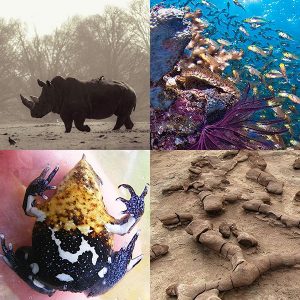Announcing the Ecological Impacts of Climate Change Collection
Post authored by Collection Curator Ben Bond-Lamberty
The ecological impacts of climate change are broad and diverse, and include alterations to species’ range limits, plant phenology and growth, carbon and nutrient cycling, as well as biodiversity and extinction risk. Recent PLOS articles have used a variety of experimental and observational approaches to examine these subjects.
Identifying at-risk regions, taxa, and species is a critical first step in adaptation and conservation efforts. A study by Mouillot et al. suggested that rare species are particularly important in conservation efforts, as rare species in diverse ecosystems are not replaceable by other species that fulfill the same ecological functions. At the same time, both rare and more common species experience the ecological impacts of climate change. Foden et al. combined biology and ecology to assess, on a global scale, the climate change vulnerability of birds, amphibians, and corals based on expert assessment and literature surveys. In a more regionally focused study, Gardali et al. assessed climate-change risk for California’s vulnerable bird species.
Birds were also the focus of two studies documenting how particular species can be ‘winners’ or ‘losers’ in a changing climate. Receding glaciers and thus increased breeding habitat have led to population increases for Adélie penguins in the southern Ross Sea. The outlook was more mixed for Pacific western grebes , which have shifted south, perhaps in response to changes in their forage fish prey. Further down the food chain, Suikkanen et al. used thirty years of marine data to infer that climate change and eutrophication drove a trophic shift in Baltic Sea food webs.
Long-term data were also used to study how flowering dates have changed since the mid-19th century. In a study that received extensive media coverage, Ellwood et al. used flowering records initiated as early as 1852 to show that high spring temperatures in 2010 and 2012 resulted in the earliest flowering in recorded history in the eastern United States. The biological pathways through which temperature affects seasonal timing in endotherms were discussed by Caro et al. Two other widely-covered studies focused on coffee: predicting future trends and identifying priorities, and climate change impacts on this plant and one of its important pests. Both examine adaptation possibilities for managing coffee crops over the coming century.
Adaptation and vulnerability were central themes for Guest et al., who reported that corals under thermal stress showed lower bleaching susceptibility at locations that bleached a decade earlier, implying an adaptive or acclimatization response. The molecular mechanisms behind such thermal tolerance were explored by Bellantuono et al.
Finally, the ecological impacts of climate change affect our health, the urban environment, and the agricultural economy. Airborne pollen counts have been increasing across Europe, and Ziello et al. suggest that rising CO2 levels may be influencing this increase. In another study, Meineke et al. used an elegant combination of observation and manipulative experiments to show that urban warming was a key driver of insect pest outbreaks in the southeastern U.S. Rising temperatures are a significant driver for the expanding range of Asian tiger mosquitoes, known vectors for West Nile and other viral infections. Warming was also found to contribute to the decreasing quality of grassland for grazers such as bison and cattle, although the effects are often exerted via complex interactions with other factors.
The broad range of these papers emphasize not only the multi-faceted impacts of climate change on ecological and human systems, but also the breadth and depth of research on these subject being reported in the PLOS journals. These journals seem a particularly appropriate venue for the ‘citizen science’ and other long-term data used by many of these studies.
Collection Citation: Ecological Impacts of Climate Change Collection (2013) http://www.ploscollections.org/ecoclimatechange
Image Credit: (Clockwise from top) William Warby. Flickr.com. Thomas Vignaud. PLOS Biology. 2011. 9(4). Colombi et al. PLOS ONE. 2013. Soto-Azat et al. PLOS ONE. 2013.
This Collection is also available on Flipboard, please search “PLOS Collections” to subscribe.

